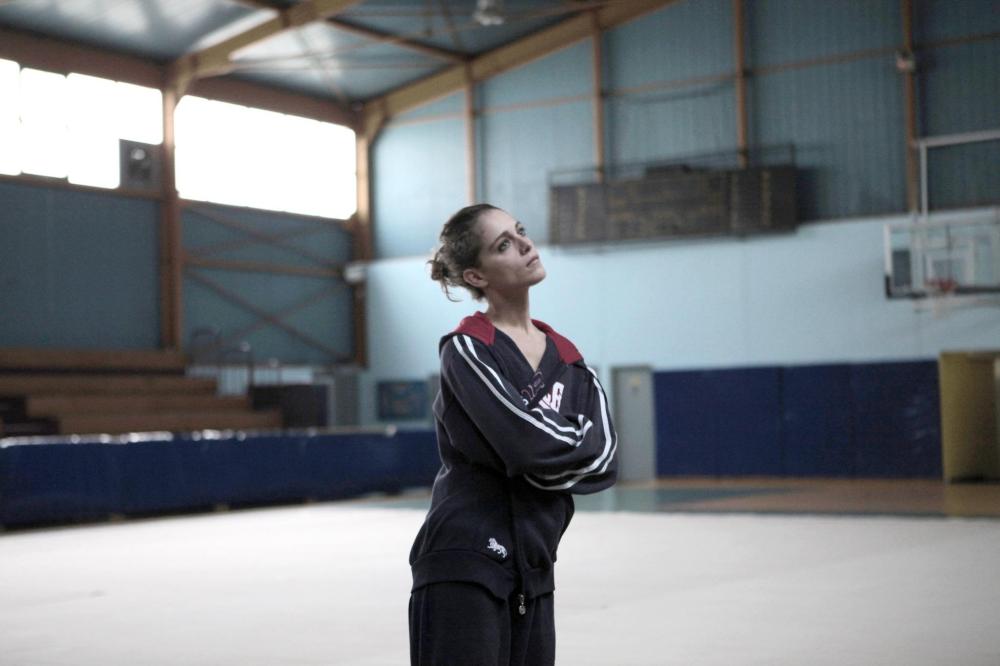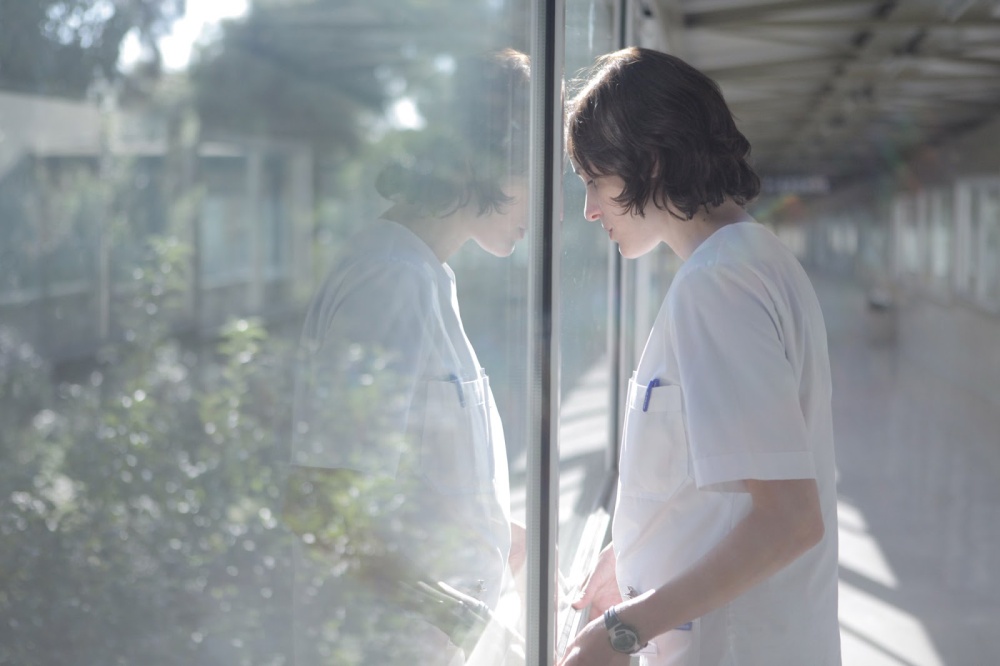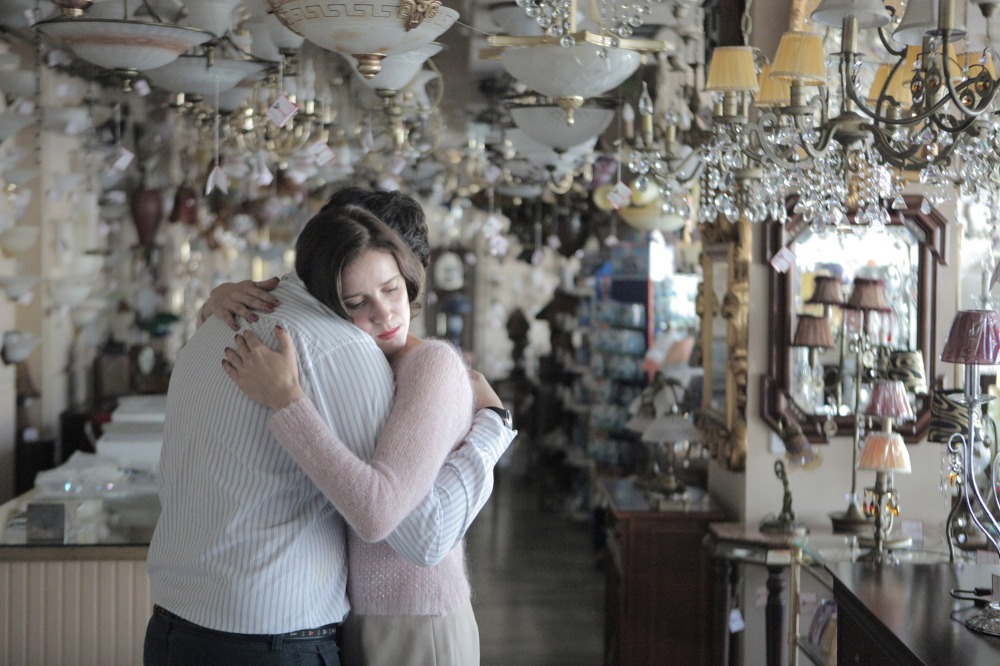★★★★☆
Yorgos Lanthimos’ third feature film is a difficult journey, yielding its secrets slowly, resonating long after one has stopped watching it. It buries its sombre and poignant emotional core in an elliptical dramatization and style which embodies the extreme difficulties associated with the subject itself, that of the intractability of grief.
Directed by Yorgos Lanthimos (Greece, 2011). Written by Efthymis Filippou and Yorgos Lanthimos. Cinematography by Christos Voudouris. Production design by Anna Georgiadou. Starring Ariane Labed, Angeliki Papoulia, Stavros Psyllakis, Aris Servetalis, Johnny Vekris.
If it can be believed, Yorgos Lanthimos’ third feature film is even more enigmatic than his celebrated Dogtooth (2009). A difficult journey, Alps (2011) is the sort of film which, after a first viewing, might seem far more palatable when recollected rather than when being watched. Like Lucrecia Martel’s The Headless Woman (2008), it’s a film that buries its sombre emotional subject in an opaque and poignant emotional dramatization, mirroring the difficulty the characters have in managing the emotional subject itself, in Martel’s film, the problem of denial and, in Alps, an intractable coming to terms with grief. However, where Martel gives us naturalism, Lanthimos uses a bleached, offbeat cinematography and an elliptical, distancing storytelling. A mysterious troupe of four players comprising an austere leader, a coach, a female nurse and a young female gymnast enter families for a month after a bereavement, substituting for the family member that has died. The ‘ambulance man’ leader (Aris Servetalis) considers the Alps a unique, unsurpassable range, suitable as a name for the rarified troupe, calling himself Mont Blanc; he gives the rest of the troupe a choice of name of lesser peaks. The intentional opaqueness of the alpine tag reflects an obscure and curious purpose. The film begins and ends with the gymnast (Ariane Labed), a depressed young girl who wishes to ribbon-dance to ‘pop’ (rather than to Carl Orff’s lugubrious Carmina Burana) and we see both cruelty and reward dished out to her by the troupe’s coach, Matterhorn (Johnny Vekris) – and the grip on the troupe exercised by its martinet-leader, who does a nice line in imitating Bruce Lee and directing a martial plan for the ‘lesser peaks’ of his dedicated band. A nurse (Angeliki Papoulia) chooses the name ‘Monte Rosa’.
With minimal context, the stories of the group members’ encounters with their client families unfold episodically, with a scatter of seemingly unrelated clues and incidents to be negotiated before we know what’s going on. We are soon enveloped, the camera constantly challenging our perception with a medley of complex shots including the placement of heads at extreme edge-of-frame with many shallow-focus shots; close shots with heads cut off; and other partially revealing shots and tracking close-ups with Steadicam. The colours are bleached and blue, and there is never any real sense of naturalism despite the absence of romanticism or obvious artifice in the mise-en-scène, which is notably mundane. On top of this, the viewer is disoriented by the shallow emotional range of the troupe’s approach to the client interactions, the exchanges stilted and formulaic, as if to enter into any heartfelt relationship with the bereaved is to risk a recurrence of a loss which may become inconsolable. The effect of this distancing is to create a painful, sterile world of artificial yet necessary encounters, in which the process of grieving is accurately mirrored as a state of disassociation and shock. The extreme stiltedness of the group members’ delivery of their roles is reminiscent of the wooden deliveries in sex films, conveying to us a grotesque pornography of grief. And yet, one assumes that the troupe is on the right lines, for there can be no substitution for the bereaved, only an approximation which tempers loss. Of course, such encounters are absurd enough to generate humour, and there is a particularly amusing scene between a lamp-shop owner and Monte Rosa, done in English, which incidentally (or deliberately) has the effect of conveying the sheer artificiality of the dialogue to an English audience. Another episode sees an elegant, older, blind woman recreating the discovery of her ‘husband’ (impersonated by Matterhorn, the coach) in flagrante delicto with Monte Rosa, an encounter which is funny rather than sad.
Thinking about Martel’s film helps with the central aspect of the drama, as Monte Rosa’s motives gradually unfold. Only towards the end do we realise that she is using her position in the troupe to substitute herself for her recently lost mother in the affections of her father (Stavros Psyllakis). The disembodied grief is the father’s and also her own, and her desire to comfort him and herself results in highly inappropriate behaviour and, ultimately, rejection, both as a daughter and as a troupe member, as she manipulates her assignment and abuses it. As with all the other ‘assignments’, the relationship between daughter and father unfolds slowly and episodically, with no clarity of intent, so that we are puzzling long over it: resolution (if we can call it that) is slow to come.
If the emotions in the assignments mimic a defence against loss through a refusal to feel, they also serve to manage the encounters, when real emotion constantly surfaces within the troupe, be it the gymnast’s despair and later, joy, or Matterhorn’s implacable coaching and his later pleasure in the success of his young charge. At the beginning of the film, Monte Rosa works with a young tennis player mortally wounded in an accident, and with her parents, an encounter which has a real human warmth of the sort we do not encounter again in wake of the tennis player’s death. However, Monte Rosa experiences sudden outbreaks of emotion during her assignments, laughing at the absurdity of what she is being asked to do – but ultimately succumbs to a numb grief of her own; we see her at the end shuffling like an automaton before a door that has been closed to her. Otherwise, there is anger and violence, from father and from Mont Blanc. The acting in the film is exemplary, although it is Angelika Papoulia as Monte Rosa who carries brilliantly the emotional weight of the film. In this melee of substitution, feigned actions, an assumption of defensive shock and the extreme claustrophobia of the heavily applied cinematography, there is a real resonance which keeps on sounding long after the film has been seen. Ineluctably, it draws one back for another dose, if not to figure out a bit more what is going on, then to sample the cinematic triumph of it all and its encapsulation of grieving. Lanthimos reveals himself as a visual storyteller par excellence, with a sure grasp of the emotional currents of human despair and inadequacy, placing him in the companionship of such subtle talents as Joanna Hogg, Lucrecia Martel and Sarah Polley.
I am indebted to my son Alasdair for his insights that arose from a discussion of this challenging film, and for his proofing of the review.



One comment